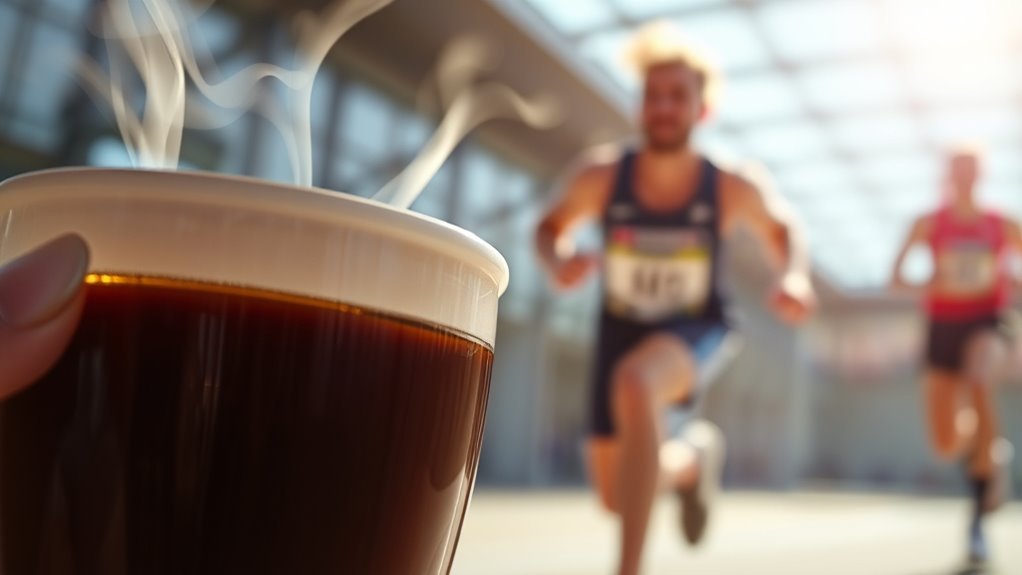The Impact of Coffee on Reaction Time in Sports
Coffee can greatly enhance your reaction time in sports due to the caffeine it contains. By stimulating the central nervous system, caffeine boosts your alertness and reduces fatigue, allowing for quicker responses to stimuli. Consuming coffee 30-60 minutes before exercise can maximize these benefits, especially when paired with adequate hydration. However, it’s important to moderate your intake to avoid dehydration and sleep disruption. There’s much more to explore about optimizing coffee use for improved athletic performance.
Understanding Caffeine and Its Effects on the Body

Although many people enjoy coffee for its rich flavor and aroma, its primary component, caffeine, plays an essential role in enhancing physical and mental performance. Caffeine metabolism varies from person to person, influencing how quickly you feel its effects. When consumed, caffeine stimulates the central nervous system, resulting in increased alertness and reduced fatigue. This is due to its physiological effects, such as blocking adenosine receptors, which promote relaxation. As a result, your reaction time may improve, making you feel sharper and more focused during physical activities. Understanding how caffeine interacts with your body can empower you to harness its benefits effectively, allowing you to optimize your performance and enjoy the freedom that comes with enhanced mental and physical capabilities.
The Role of Reaction Time in Athletic Performance
Caffeine’s ability to enhance alertness directly relates to the importance of reaction time in sports. Your reaction time can greatly impact athletic performance, determining how quickly you respond to stimuli, whether it’s a starting gun or an opponent’s move. In fast-paced sports, even milliseconds can make the difference between winning and losing. Enhanced reaction time allows you to execute plays more effectively, avoid injuries, and adapt to changing situations on the field or court. Training to improve your reaction time alongside your physical skills can lead to a well-rounded athletic ability. Understanding this relationship empowers you to make informed choices about your nutrition and preparation, allowing you to maximize your potential in competitive environments.
How Coffee Enhances Reaction Time

When you consume coffee, the caffeine it contains can markedly boost your reaction time, making it a popular choice among athletes. Caffeine enhances your performance by speeding up caffeine metabolism, allowing your body to process it more efficiently. This process leads to increased levels of adrenaline, which heightens neural stimulation throughout your nervous system. As a result, your brain can respond quicker to stimuli, improving your overall agility and coordination. Research shows that even small amounts of caffeine can substantially enhance your reaction times, allowing you to perform better under pressure. By incorporating coffee into your routine, you can take advantage of its benefits and gain that edge you’re looking for in competitive sports.
Optimal Timing and Dosage of Coffee for Athletes
To maximize the benefits of coffee for athletic performance, it is crucial to take into account both timing and dosage. Proper pre workout consumption can greatly influence your results. Here are some practical guidelines:
- Timing: Consume coffee 30-60 minutes before your workout for ideal caffeine metabolism.
- Dosage: Aim for 3-6 mg of caffeine per kilogram of body weight, depending on your tolerance.
- Hydration: Pair your coffee with water to prevent dehydration, as caffeine can have a diuretic effect.
- Frequency: Limit coffee intake to 1-3 times per week to maintain its effectiveness and avoid tolerance buildup.
Potential Drawbacks of Coffee Consumption

While coffee can enhance athletic performance, it’s important to be aware of its potential drawbacks. One significant concern is dehydration risks. Caffeine is a diuretic, which means it can increase urine production, potentially leading to dehydration, especially during intense workouts or competitions. If you’re not careful, this could impair your performance rather than boost it.
Additionally, coffee consumption can lead to sleep disruption. If you drink coffee too close to bedtime, you might find it hard to fall asleep or stay asleep, which can negatively impact recovery and overall performance. Balancing coffee intake is essential; enjoying it in moderation can maximize its benefits while minimizing its drawbacks. Always listen to your body and adjust accordingly.
Real-World Applications and Athlete Experiences
Although many athletes turn to coffee as a performance enhancer, its real-world applications and effects can vary considerably from one individual to another. Athlete testimonials highlight diverse experiences, making it essential to approach coffee use with a critical mindset. Here are some practical insights from performance analysis:
- Personal Tolerance: Understand your caffeine sensitivity; some thrive on it, while others feel jittery.
- Timing Matters: Experiment with timing; consuming coffee an hour before performance can boost reaction times.
- Hydration Balance: Don’t forget hydration; coffee can be dehydrating, impacting overall performance.
- Test It Out: Incorporate coffee into training sessions first to gauge its effects on your performance.
Ultimately, the key is to find what works best for you.
Frequently Asked Questions
Can Coffee Improve Reaction Time in Non-Athletes?
Absolutely, coffee can enhance your reaction time, even if you’re not an athlete. Research shows that caffeine, a key component in coffee, offers significant cognitive benefits. It boosts alertness and concentration, which can lead to faster decision-making and improved response times. If you’re looking for a simple way to enhance your mental performance in daily tasks, a cup of coffee might just be the boost you need. So, go ahead and enjoy that brew!
What Are the Long-Term Effects of Coffee on Athletic Performance?
When considering the long-term effects of coffee on athletic performance, you’ll find that regular consumption can enhance endurance training and performance recovery. Research suggests caffeine may improve aerobic capacity, allowing you to train harder and recover faster. However, moderation is key; too much caffeine can lead to dependence or disrupt sleep. Balancing coffee intake with your training regimen can help you harness its benefits while maintaining overall health and performance.
Is Decaffeinated Coffee Effective for Improving Reaction Time?
Imagine you’re at a café, contemplating whether to order decaf instead of your usual caffeine fix. While decaf won’t give you the same immediate boost, it still offers some decaf benefits, like improved focus without the jitters. Research suggests that while decaf isn’t as potent as regular coffee for enhancing reaction time, it can serve as a valuable caffeine alternative for those sensitive to stimulants, allowing you to maintain performance while enjoying your drink.
How Does Coffee Consumption Affect Hydration Levels in Athletes?
Coffee consumption can impact hydration levels in athletes, especially considering individual caffeine sensitivity. While moderate intake might not lead to significant dehydration, it’s crucial to implement effective hydration strategies. If you’re sensitive to caffeine, you might want to monitor your coffee intake closely, as it can have a diuretic effect in some cases. Balancing your hydration with water and electrolytes guarantees peak performance, regardless of your coffee habits. Stay aware and adjust accordingly!
Are There Age-Related Effects of Coffee on Reaction Time?
When considering age-related effects of coffee on reaction time, it’s essential to note that age differences can influence cognitive decline. Younger individuals might experience enhanced alertness and quicker reaction times after coffee consumption, while older adults may not see the same benefits due to age-related cognitive changes. Additionally, excessive coffee intake can lead to jitteriness, which may negatively affect performance, regardless of age. Balancing consumption is key for ideal cognitive function at any age.






